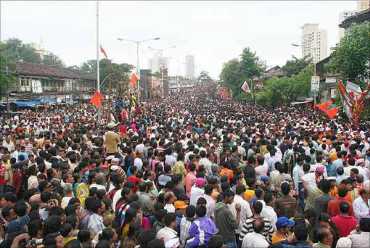Photographs: Rediff Archives Shilpa Shet
Here's what India's youth think about the politicisation of Ganesh Chaturthi, speaking their minds about how this tide can and should be turned around.
There is one more fallout of the Anna Hazare movement. The young no longer mince words and are seeing the world for what it is.
And most of them are definitely calling the sarvajanik (public) Ganeshostav a sham.
The outspokenness would have made Lokmanya Balgandharva Tilak very happy, although one is not sure if he would be happy with the way the festival is celebrated today.
We spoke to the young across India to get their perspective and here's what they have to say...
...
'I have not visited a single stall in years'
Public Relations professional Ashish Wagh from Bangalore says, "It's more of a show of political strength here. At least in Mumbai and Pune there is some true public spirit left." He feels that the Ganesh festivals do not affect the public anymore. "The common man is not really bothered," he opines, "Only those with the mandals are excited about the whole thing."
Adds Neeta Agarwal, an advertising professional, from Mumbai, "I think the only people who feel strongly about the Ganesh festival are the locals, like my maid and her family. They all plan and go visit the pandals for Ganpati. I have not visited a single stall in years."
And Neeta is not alone. Prasad Joshi, a research associate from Pune says, "I feel the public display is more of a display of power by political parties. It is also a way to use their black money."
There is nothing holy about the public face of Ganeshotsav. Most pandals or mandals vie with each other, trying to outshine and outwit each other for some local accolade.
Some of them send out public messages. Do these public messages make sense?
"These messages seem hollow, almost like doublespeak"
"These messages seem hollow, almost like doublespeak," says Armeen Patel from Ahmedabad, "Who cares about these messages? When you see these thug-like people around the pandal, are you going to go near it? The message I am getting here is stay away. And we are doing just that."
She too admits she hasn't gone to a pandal in years. "I've been to a few in Mumbai, at least the people there are more devout than the people here. There are pandals in Ahmedabad, but they do not match those in Mumbai," she adds. "None of my friends go to see any either."
Youngsters in Hyderabad, however, seem more enthusiastic. Munira, a college student from Hyderabad says, "All of us friends are going to watch the pandals for Ganpati in a couple of days. I think it is fun. This is the first time I am going with friends. Before this I've always gone with my family."
But comparatively, in other metros this year the overall mood seems low-key. The attendance at most of the mandals is low. Says Dayanand Patil from Pune, "We've had a poor turnout this year. I think it's mostly due to the rains. Normally, people come during the weekend. But it was raining this weekend, so very few people came."
'Cultural, song-dance events are what gets people together and that's important'
So, how does one celebrate the Ganesh festival publicly? "There are still some small mandals like the ones in societies where they have some shows, cultural events, song-dance events," says Prasad. "That is what gets people together and that's important."
Yes, that's probably the reason for this entire "public" flavour to it.
Adds Ashish, "Most Indians revere Ganesha and this is one God that can get everyone together. This liking can be harnessed to ensure that the celebrations are vibrant and the mood remains positive."
In Pune, it's the students and young professionals who play the traditional music. They train days ahead before the visarjan (immersion) day. One can feel the adrenaline rush that participating in such an activity generates.
'In our society... we would sing aartis and play together'
Neeta reminisces, "I remember when we were young our society would have these programmes. It was great fun and we would sing aartis and play together. The society still has the programmes and the newer generation takes part. The festival spirit is still there, though, of course the numbers have dwindled."
Neeta feels that the local mandals, which are obviously patronised by some local politician or party, should not be given so much importance.
"They are the ones who are ruining the social spirit," she adds, "I can understand a Lalbaugcha Raja or some other Ganeshas that are popular, but now you have mandals on the corner of every road. What are they achieving anyway?"






Comment
article